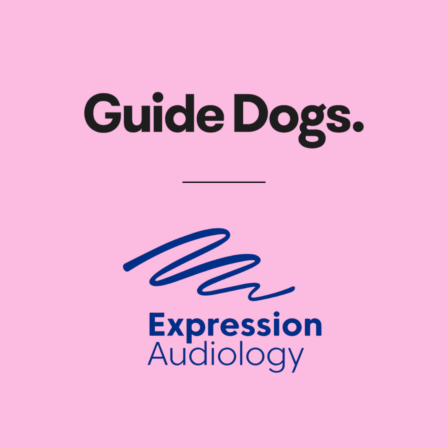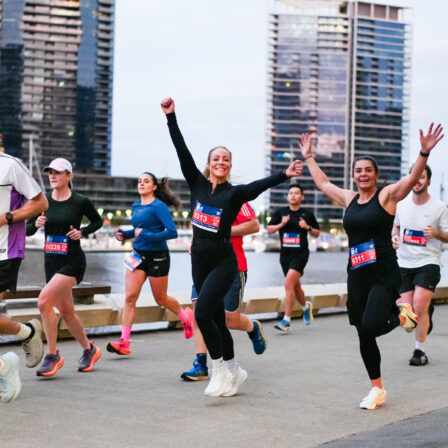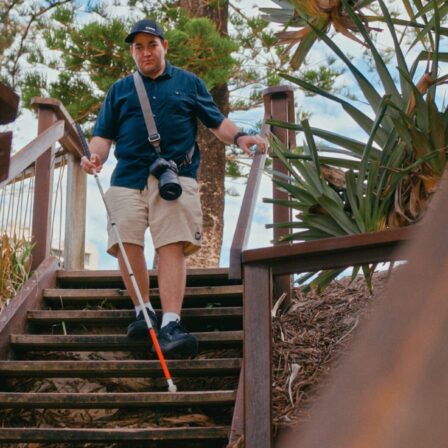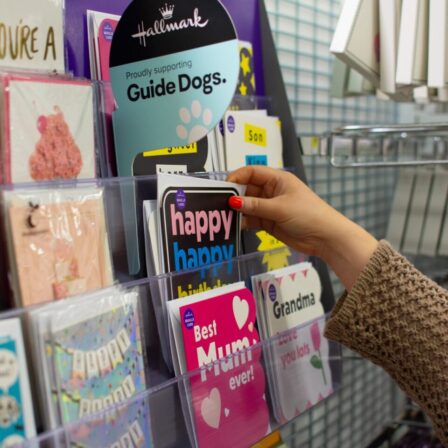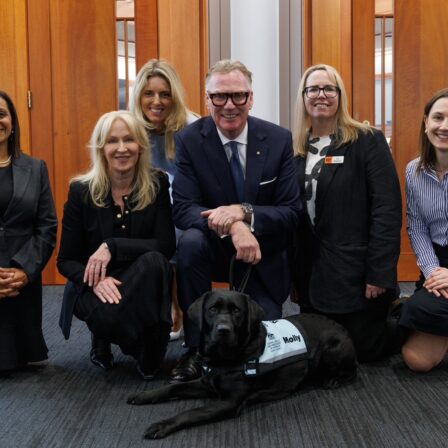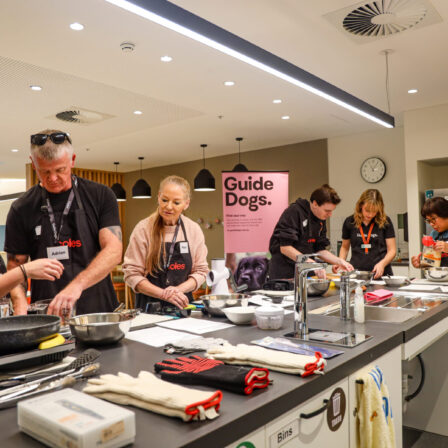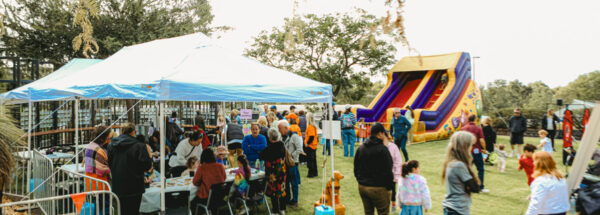News
COVID-19: Business Continuity Updates
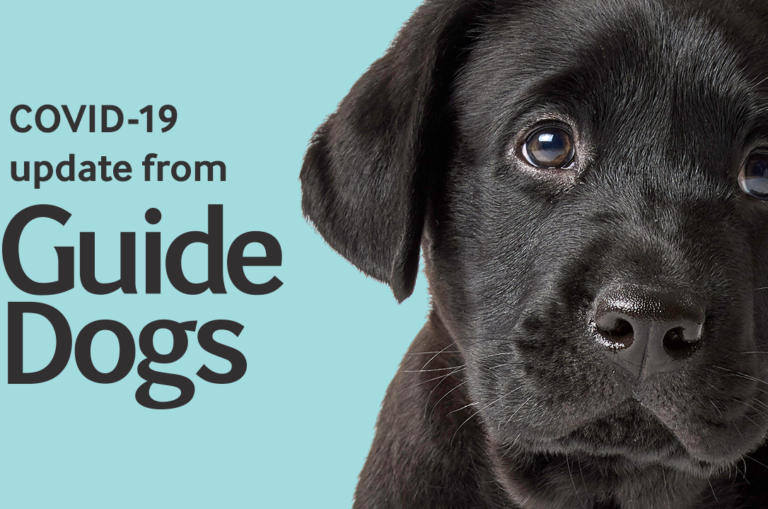
Update 22/05/20:
Gradual resumption of face-to-face Client services.
The Victorian government has agreed to ease some COVID-19 restrictions, which will now enable GDV to begin the process of reintroducing some of our services, albeit with stricter safety protocols in place.
The health and wellbeing of our Clients, workforce, dogs and the community remains our highest priority at this time.
Right now any option for face-to-face services requires some flexibility, social distancing and infection control measures and discussion with individual Clients so we can evaluate on a case by case basis. Telepractice will continue to be an option should you wish to maintain this, with a slow phasing in of in-person services based on prioritisation of demand and your consent.
In relation to the resumption of face-to-face services for school-aged children, Guide Dogs has been advised by schools that they too are planning a slow and staged reintroduction of services. We are working closely with all schools and once they have provided us with permission to attend we will contact parents to discuss what that might look like. In the meantime we ask that if anyone has a concern about any services that they please
contact us on 1800 804 805 so we can talk you through the process. Any feedback is also welcomed.
Tips for keeping your Guide Dog active and healthy:
Guide Dogs need to maintain a training routine and enjoy some regular exercise if they are to remain fit and healthy and do the job for which they have been specifically bred and raised.
Some Guide Dog Handlers have been asking for some basic tips on how to achieve a good training routine while physical and social interactions remain restricted. Following are three areas on which you could focus:
1. Short walks
Short walks every day are highly beneficial for Guide Dogs and will ensure he or she gets some regular exercise. Always choose a route that is familiar to you and avoid busy areas to ensure social distancing for you and the dog.
2. Sharpening up skills
There a number of things you can do each day to maintain the dog’s skills such as:
- placing the dog’s harness on for a few hours each day, including leaving it on for an hour or so after a walk
- having the dog sit at your feet under your seat or desk with their harness on for an hour or more, particularly if you normally take the dog to work or study outside of the home
- target specific door and seat behaviour
- freshen up the dog’s obstacle skills using bins in the driveway, or even some items in the home
- teach basic obedience such as sit, lie down, go to bed, stay
- use enrichment toys so the dog can remain interested and alert.
3. Grooming
Guide Dogs need regular grooming to keep their coat in good condition. Always brush the dog with long strokes, starting from the nape of the neck down the back or flanks, and then down the thighs. Don’t forget the tail.
If it is too difficult to give the dog a bath at this time you can moisten a towel and rub the dog all over to remove any loose dirt. The dog will love it!
If you want further information or have any specific questions about caring for a Guide Dog during these times, your Guide Dog Mobility Instructor will be pleased to assist.
Accessible options for COVID-19 testing.
Some Clients have raised questions about what accessible options are available for testing for COVID-19 for people with blindness or low vision should they develop symptoms.
We contacted the COVID-19 hotline and were advised that there are three options available:
Participating hospitals:
Participating hospitals are providing safe and accessible testing facilities both inside and outside their premises. You will need to check with your local hospitals to determine if they are providing this service.
General Practitioners:
Some General Practitioners are providing testing for COVID-19 inside and outside their premises. You will need to contact your local GP to determine if they are offering these tests and what processes are involved.
Drive-through testing as a passenger:
You can attend a drive-through testing facility as a passenger. Because the driver is considered a carer for health reasons, and the travel will be identified as essential, then he or she will not be breaching any social distancing laws or other restrictions.
To find a testing centre in your local area visit the Victorian Government’s COVID-19 testing website.
Update 17/04/20:
We have expanded our telepractice service delivery options.
Telepractice will be Guide Dogs’ primary service delivery mode while the mandatory social distancing restrictions remain in place. We will continue to look at all options and government advice to be ready to resume face-to-face services.
In addition to Guide Dogs’ services, many other organisations are providing assistance to people with a disability to help them access essential services such as food and grocery shopping and education supports. We are working closely with others in the sector, including Blind Citizens Australia, to share information and resources with you.
Below is more information about Guide Dogs and some other services that are now available to clients.
Services via telepractice
Telepractice is a method of providing services from a distance using communications technology like a phone or internet connection. As a Guide Dogs client, you only need access to a phone to get started with telepractice. Some programs work best with an audio and video connection, which can be accessed using the internet on a Smart Phone, tablet or computer.
All Guide Dogs services are now offered through telepractice. With some modifications to the way we normally work together, services delivered through telepractice are as safe and high quality as our usual in-person services. Some Orientation & Mobility and Guide Dog Mobility services which usually take place in public may be particularly impacted by mandatory social distancing requirements. Our specialists can work with you to determine your current mobility goals and options to keep working towards them at this time.
Guide Dogs staff have been busy contacting as many active clients by telephone as possible to discuss their individual service needs and seek feedback on their experience with social distancing and accessing essential services and information. If you would like to access one of our services through telepractice, or provide feedback on your experience, please contact our team on 1800 804 805.
GDV NDIS Support Program Expanded
NDIS is experiencing higher demand for services due to the COVID-19 restrictions and as a result has brought forward many client annual reviews. We understand this has caught some clients off-guard and to assist GDV is expanding its NDIS support program with our NDIS specialists for all eligible clients (including those who are unfunded) for a limited time.
Our NDIS specialists can help to plan for an annual review, provide simple advice, make referrals to practitioners to recommend specific Assistive Technology or additional services.
Practitioner services can be claimed through current NDIS plans or through philanthropic funding if clients are out of funds or without an existing plan.
GDV has also made the decision not to charge clients the additional 10 per cent loading on some NDIS services which the Australian Government has introduced to provide financial relief to providers. These services include:
- core supports (Assistance with Daily Life (excluding Supported Independent Living) and Assistance with Social and Community Participation)
- capacity building supports (Improved Daily Living).
Additionally, we will not charge for cancellations in accordance with our current policy.
Food and grocery shopping
Woolworths and Coles have established priority online shopping for people with a disability or who are over 65 years of age. Go to Woolworths Online Priority Shopping or Coles Online Priority Shopping.
NDIS funded clients can access a priority home delivery service for grocery items following an agreement between the NDIA and the major supermarket retailers. Visit the Priority Home Delivery Service page on the NDIS webpage.
NDIS sent out a unique home delivery access code to clients on NDIS by SMS or email. This code is required for supermarket online ordering priority shopping. If you did not receive your code then we recommend you contact your local NDIS office.
If you are over the age of 65 and registered with My Aged Care then you will be required to use your My Aged Care ID number when using the priority shopping.
Online Education
Schools and other educational institutions are required to provide accessible education resources to students who need them. It is important therefore to check first with the school/institute if you and/or your children require assistance with accessing online education resources. Please contact your local Guide Dogs staff member if are not able to receive assistance from the school/institute to discuss what we may be able to do to assist you.
We would be happy to receive your feedback on any of the information provided or for you to raise issues that have not been addressed. Please contact your local Guide Dog services staff member or our Customer Service team via 1800 804 805.
Update 08/04/20:
Keeping the Guide Dogs community connected during COVID-19
Here at Guide Dogs, we know how powerful social media can be in keeping people connected, especially those members of our community who are most vulnerable or isolated.
At a time like this, it has been important for us to step back and review how we are currently using our social media channels and how we can harness them to add real value to our followers’ lives.
As you can imagine, we are also faced with some challenges in this space. Our access to people and dogs is obviously limited right now, making it difficult to create the volume of lively and engaging content we would love to.
So, we’ve been working hard to come up with a solution that will enable us to keep our followers up to date, be even more agile in our responses, provide light relief during an otherwise dark time, and support our national partners, some of whom are also going to be doing it tough right now.
From today we will be streamlining our social channels, starting with utilising the Guide Dogs Australia Facebook page as our single point of contact for followers in Victoria as well as across New South Wales and ACT.
This doesn’t mean we are merging into one organisation. But by joining forces online, it does mean we can harness the creativity and resources of our social media teams around the country to bring our followers the most up to date, relevant and engaging content, and will ensure we can be more responsive and better able to support the Guide Dogs community during this challenging time.
Follow Guide Dogs Australia accounts for more pupdates:
Facebook: https://www.facebook.com/GuideDogsAustralia/
Instagram: http://instagram.com/guidedogsaustralia
Twitter: https://twitter.com/GuideDogsAUS
LinkedIn: https://www.linkedin.com/company/18160951/
Update 02/04/20:
Health and safety protocols for Guide Dog Handlers in managing COVID-19
Your Guide Dog will play a vital role in supporting you during the new mandatory requirements for containing the spread of COVID-19 in the community.
However, if you contract COVID-19, develop symptoms, or have been in contact with someone with a confirmed case of COVID-19, there are important steps you must take to protect yourself and others. This may include during hospitalisation, self-isolation, or in quarantine.
The Federal Government announced on Sunday, 29 March 2020, new rules to limit social contact to one person outside of your immediate family either within your home, or in public places. This means you can still go for a walk with your dog and family members and/or one non-family contact, provided you follow the required social distancing recommendations and any specific State or Territory laws with regards to these new measures.
Our veterinarians have provided the following advice to help you manage your dog and your health while these COVID-19 restrictions remain in place.
How should I be interacting with my dog in these times?
Normal interactions with your own dog, including good hygiene practices such as hand washing prior to and after petting, should be continued. It is best in all situations to not kiss your dog or share food or utensils.
Although it is highly unlikely, there is the risk that your dog can act as a fomite (surface) for the spread of disease. For this reason, you should extend your social distancing measures to include your pet. It is OK to go for walks, but do not allow other people to pet your dog. When you come home you can wash your dog’s feet in soap and water, just as you wash your hands.
Can my dog catch COVID-19?
There is no evidence of dogs contracting COVID-19 but, as stated above, they can carry the virus or parts of the virus on their coats, nose or mouth. It is therefore critical that any social distancing practices apply to your dog as much as they apply to you.
What can I do now to be prepared in case I cannot care for my dog?
It is best that you contact your family members or close contacts to discuss possible care for your dog in the event that you require hospitalisation or need to be in quarantine. If you do not have any family or close contacts you can call upon, please contact your local Guide Dog staff member to discuss alternative arrangements.
You should prepare an emergency kit including a minimum of two weeks’ food, medications, notes around health concerns and contact details for your dog’s veterinarian.
What if I am diagnosed with COVID-19?
If you are diagnosed with COVID-19 you will need to be careful not to transmit the virus to others. This will include the person that is going to take your dog should you require care. To reduce the risk of passing on the virus you will need to:
- Reduce interaction with your dog as much as possible.
- If available to you, have another household member perform the daily tasks such as feeding and playing with your dog.
- Do not cough on or near your dog.
Should your dog be cared for someone outside your household if you are unwell, they can institute a procedure to limit their risk of contact with yourself or any potential virus on the dog. This will involve:
- Wearing personal protective equipment such as a face mask, gloves and goggles
- Taking your dog from the backyard without contact with yourself using their own lead and collar.
- Washing the dog in your front yard with liquid soap. Lather this on for at least 10 minutes, over the entire body and head but avoiding the eyes and ear canals, then rinse off well.
- Washing the lead and collar
If the person caring for your dog is concerned about possible transmission of COVID-19, contact your veterinarian. They may be able to perform the pick-up and bathing or quarantine your dog for a few days between housing if necessary.
What if I develop symptoms or come in contact with a confirmed COVID-19 carrier?
If you develop symptoms of COVID-19 it is important to seek medical advice immediately and to follow the guidelines at www.health.gov.au. If you have been near someone confirmed with COVID-19 you need also to follow the health department’s guidelines.
Additional information
Commonly asked questions and up to date information regarding COVID-19 and pets can be found at the following links:
- World Small Animal Veterinary Association (WSAVA) / this is their current press release.
- World Organisation for Animal Health (OIE)
- The Centre for Disease Control (CDC)
Update 25/3/20:
An important safety message for all Guide Dog Handlers using taxis and ride share services for travel
Some important changes have been made to normal procedures for Guide Dog Handlers using taxis and ride share services such as Uber to further minimise risk during the COVID-19 pandemic.
The most important change is that all Guide Dog Handlers are being asked to travel in the back seat of the vehicle on the recommendation of the Federal Government, the Taxi Industry, the Ride Share Services sector and Guide Dogs Australia. Guide dogs are now required to sit at the handler’s feet in the back footwell.
This change requires a different approach to entering a taxi or ride share service. Under normal circumstances, Guide Dog Handlers are trained to use the front seat but with new social distancing regulations in place this is no longer advised.
Guide Dog Handlers should ask taxi and ride share services’ drivers to move the front passenger’s seat as far forward as possible to provide room for the dog.
There is no change in advice on exiting the vehicle in that the Guide Dog Handler should exit the taxi/ride share service with their dog as per the normal procedure.
Below are the new recommended steps for Guide Dog Handlers entering and exiting taxis and ride share services:
- When approaching a taxi or ride share service vehicle, do as you would normally do by locating the front passenger door. Then, while facing the vehicle, move one metre to your right and locate the back passenger door.
- Ask the driver to move the front passenger seat as far forward as possible.
- Remove your Guide Dog’s harness so that it does not become caught under the front seat. This is also a more comfortable way for you and your guide dog to travel.
- Place your dog on a long lead and have your dog wait while you position yourself on the back seat.
- Ask your dog to sit at your feet in the back footwell. Make sure the dog’s tail is inside the vehicle before closing the back door.
- When exiting the vehicle with your dog do so as per normal procedure.
- Re-harness your dog and proceed to your destination.
At all times it is essential to keep you and your dog at a safe distance from others to minimise the risk of coming into contact with potential COVID-19 carriers.
Update 17/03/20:
Guide Dogs is closely following the recommendations of the relevant government authorities in relation to the containment of the COVID – 19 virus within the community.
We acknowledge that these are challenging times.
Be assured, the health and wellbeing of our Clients, workforce and dogs remains our priority.
We are activating our plan to ensure we have continuity of care to those most in need, in line with the restrictions currently in place.
If you need support immediately, please contact our Customer Service team on 1800 804 805 or email reception@guidedogsvictoria.com.au.
In the meantime, please ensure you stay informed on the latest advice from authorities.
Guide Dogs will continue to provide you with regular updates as the situation unfolds.

